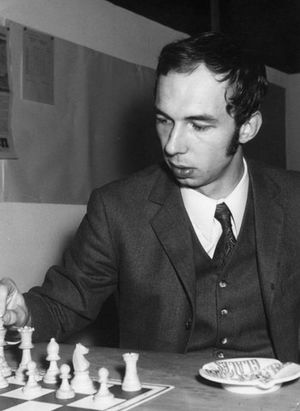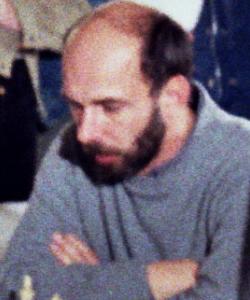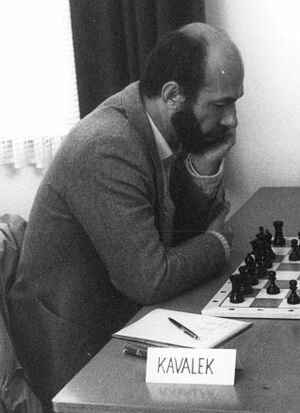Lubomir Kavalek facts for kids
Quick facts for kids Lubomir Kavalek |
|
|---|---|

Kavalek in 1968
|
|
| Country |
|
| Born | August 9, 1943 Prague, Czechoslovakia |
| Died | January 18, 2021 (aged 77) Reston, Virginia, U.S. |
| Title | Grandmaster (1965) |
| FIDE rating | 2527 (March 2026) (retired in 1999) |
| Peak rating | 2625 in 1974 |
Lubomir (Lubosh) Kavalek (Czech: Lubomír Kaválek, born August 9, 1943 – died January 18, 2021) was a famous Czech-American chess player. He earned the titles of International Master and International Grandmaster from FIDE in 1965. Kavalek won two Czechoslovak championships and three U.S. championships. In 1974, he was ranked as the world's 10th best player. He joined the U.S. Chess Hall of Fame in 2001. Kavalek was also a chess coach, organizer, teacher, and writer.
Contents
- Life Story of Lubomir Kavalek
- Lubomir Kavalek's Chess Achievements
- Lubomir Kavalek as a Coach
- Organizing Chess Events
- Awards for Brilliant Chess Games
- Later Life and Passing
- Famous Chess Games by Kavalek
- See also
Life Story of Lubomir Kavalek
Kavalek was born in Prague, which was then part of Czechoslovakia (now the Czech Republic). He studied at the University of Žilina. However, he decided to become a professional chess player instead of finishing his studies. He also worked as a reporter for news outlets.
Leaving Czechoslovakia
Kavalek won the Czechoslovak chess championship in 1962 and 1968. In August 1968, when Soviet tanks entered Prague, Kavalek was playing in a chess tournament in Poland. He strongly disliked the communist government. So, he chose to leave his home country and move to the West. He used his tournament winnings to buy vodka. He then used the vodka to bribe border guards to let him drive into West Germany. This event was called "the biggest loss ever suffered by Czechoslovakian chess."
Starting a New Life in America
Later, Kavalek moved to Amsterdam on a student visa. In 1970, he moved to the United States. On his way to America, Kavalek won a big tournament in Caracas. He played the first half of the tournament for Czechoslovakia and the second half for the United States. This meant he represented the U.S. before even arriving there! Kavalek settled in Washington, D.C. He studied literature and worked for Voice of America. By 1973, he became a full-time chess professional. He later became a citizen of the United States. He lived in Reston, Virginia.
Lubomir Kavalek's Chess Achievements
Winning National Championships
Kavalek played in four Czechoslovak championships. He had great success in three of them:
- 1962: At just 19 years old, he became the youngest player to win the Championship of Czechoslovakia.
- 1963: He tied for second place.
- 1968: He won the strongest championship ever held in Czechoslovakia.
US Championships
Kavalek won or shared first place in three U.S. championships:
- 1972: He tied for first place with two other players in New York.
- 1973: He was a co-winner.
- 1978: He won outright, finishing a full point ahead of the second-place player.
Major International Victories
Kavalek had many important wins in international tournaments:
- 1968: He achieved his first major international victory in Amsterdam.
- 1970: On his way to the United States, Kavalek won another strong tournament in Caracas.
During the 1970s, Kavalek was known as one of the most active and successful U.S. players in tournaments.
Kavalek's Best Year: 1973
Besides sharing first place at the U.S. championship, Kavalek won four other tournaments in 1973:
- Lanzarote
- Netanya
- Montilla (shared first)
- Bauang
He also placed third in tournaments in Amsterdam and Manila. Because of these great results, Kavalek reached number 10 in the world on the official FIDE rating list in 1974. His rating was 2625. Also in 1974, he shared first place in Solingen.
Zonals and Interzonals
Kavalek placed third at the 1966 The Hague European Zonal. This allowed him to qualify for the 1967 Interzonal in Sousse. There, he was one of only three players to draw a game with the legendary Bobby Fischer. In the Manila Interzonal in 1976, Kavalek finished seventh. He also qualified for the 1979 and 1987 Interzonals. However, he never reached the final Candidates Matches to challenge for the World Championship.
Other Notable Chess Results
More First Places
- Split 1964 (shared first)
- Varna in 1965 and 1967
- Zwolle in 1967
- The Hague in 1968
- Netanya 1971 (shared first)
- The West German International Championship in Bochum in 1981
- Mentor Hall of Fame Classic, Alexandria 1996
- Dutch Open in Dieren in 1969, where he achieved a perfect score of 10 wins and 0 losses.
Second Places
- Leipzig in 1965 (shared second)
- Polanica Zdroj in 1968
- Montilla-Moriles in 1976 (tied for 2nd-4th)
- Waddinxveen, Netherlands, in 1979
The Unusual Montreal 1979 Tournament
In 1979, Kavalek played in and organized the Man and his World Chess Challenge in Montreal. This tournament had a very strange result for him. He finished last in the first half of the tournament. But then, he won the second half! He ended up tying for seventh place overall.
Other Strong Showings
- Bucuresti 1966 (third place)
- Tilburg 1977 (shared third place)
- Amsterdam 1977 (shared third place)
- Amsterdam 1981 (shared fourth place)
Playing for Teams and Olympiads
Kavalek played in nine Chess Olympiads. He represented Czechoslovakia in 1964 and 1966. From 1972 to 1986 (except 1980), he played for the United States. In his seven times on the U.S. team, he played on the top board three times and the second board twice. His teams won one gold medal and five bronze medals. In 1976, he was part of the first U.S. team to win a gold medal since the 1930s.
From 1969 to 1991, Kavalek was a key player for the German team in Solingen. During this time, his team won 10 national championships. They also won the European Club Championships in 1976 and 1990. In the 1977–79 European Club championship, Kavalek scored very well on the top board.
In a team match between Nordic countries and the United States in Reykjavik in 1986, Kavalek defeated Bent Larsen. In a match between Moscow and Prague in April 1968, Kavalek beat Evgeny Vasyukov. In 1976, Kavalek was the top player for the Washington Plumbers team, which won the National Chess League.
Chess Matches
Kavalek won two international matches:
- 1969: He won a 10-game match against the Dutch champion Hans Ree in the Netherlands.
- 1978: Kavalek won a match against the strong Swedish grandmaster Ulf Andersson.
Kavalek lost two matches against top world players in Solingen, Germany. In 1970, he lost to Bent Larsen. In 1977, he was defeated by Boris Spassky.
Chess Rating
Kavalek was ranked among the top 100 chess players in the world for a long time, from late 1962 until September 1988. He reached his highest ranking of number 10 in 1974. At that time, his highest Elo rating was 2625 on the FIDE Rating list.
Lubomir Kavalek as a Coach
Kavalek was also a very good chess coach. He worked with many famous players like Mark Diesen, Robert Byrne, Yasser Seirawan, Eugene Torre, and Robert Hübner. Kavalek was one of Bobby Fischer's assistants during the World Chess Championship 1972. He also trained British grandmaster Nigel Short for his important matches leading up to Short's 1993 world championship match against Garry Kasparov.
Organizing Chess Events
Kavalek also helped organize major chess events:
- He was the main organizer of the important Man and his World Chess Challenge in Montreal in 1979.
- As Executive Director of the Grandmasters Association, he organized the first World Cup series in 1988–1989.
- He also organized the Prague 90 tournament in 1990.
Awards for Brilliant Chess Games
Kavalek won three important prizes for his brilliant chess games:
- At the 1962 Student Olympiad in Mariánské Lázně, Czechoslovakia, he won the brilliancy prize. This was for his famous win against Soviet master Eduard Gufeld. This game is ranked 7th in "The 100 Best Chess Games of the 20th Century."
- At the 1965 Student Olympiad in Sinaia, Rumania, Kavalek won the best game prize against another Soviet player, Herman Khodos.
- In 1975 in Wijk aan Zee, Kavalek won a prize for the Most Spectacular Game against Lajos Portisch.
Later Life and Passing
Kavalek passed away peacefully in his sleep at his home in Reston, Virginia, on January 18, 2021. He was 77 years old. He is survived by his wife, Irena Kavalek, his son Steven Kavalek, his daughter-in-law Theresa Kavalek, and his grandson Steven Kavalek, Jr.
Tributes from Chess Players
Many chess players shared their thoughts after Kavalek's passing:
- GM Andrew Soltis: "If you have a bad day, look at the 1962 game of Gufeld-Kavalek. I'll be looking at it several times today."
- GM Nigel Short: "Sad to hear about the death of my former trainer, Lubosh Kavalek. I am forever grateful for his help."
- GM Ruslan Ponomariov: "He was a true chess legend. As a child, his games inspired me to study chess."
Famous Chess Games by Kavalek
| This section uses algebraic notation to describe chess moves. |
Here is a great win by the young Kavalek against Soviet grandmaster Eduard Gufeld. It's said that Gufeld's soccer team had beaten Kavalek's the day before, and Kavalek wanted revenge:
Gufeld–Kavalek, Student Olympiad, Mariánské Lázně 1962
1. e4 e5 2. Nf3 Nc6 3. Bb5 Bc5 4. c3 f5 5. d4 fxe4 6. Ng5 Bb6 7. d5 e3 8. Ne4 Qh4 9. Qf3 Nf6 10. Nxf6+ gxf6 11. dxc6 exf2+ 12. Kd1 dxc6 13. Be2 Be6 14. Qh5+ Qxh5 15. Bxh5+ Ke7 16. b3 Bd5 17. Ba3+ Ke6 18. Bg4+ f5 19. Bh3 Rhg8 20. Nd2 Bxg2 21. Bxg2 Rxg2 22. Rf1 Rd8 23. Ke2 Rxd2+ 24. Kxd2 e4 25. Bf8 f4 26. b4 Rg5 27. Bc5 Rxc5! 28. bxc5 Bxc5 White has two rooks for a bishop, but cannot stop Black's pawns from moving forward. 29. Rab1 f3 30. Rb4 Kf5 31. Rd4 Bxd4 32. cxd4 Kf4 0–1 This is an amazing final position. Black is down a rook, but still has all eight of his pawns, and White cannot stop them.
Here is one of Kavalek's most amazing games. In this game, he gave up his queen for a bishop against the strong Hungarian grandmaster Lajos Portisch:
Portisch–Kavalek, Wijk aan Zee, 1975
1. d4 Nf6 2. c4 g6 3. Nc3 Bg7 4. e4 d6 5. f3 c6 6. Be3 a6 7. Bd3 b5 8. e5 Nfd7 9. f4 O-O 10. Nf3 Nb6 11. b3 N8d7 12. a4 bxc4 13. bxc4 c5 14. a5 cxd4 15. Nxd4 dxe5 16. Nc6 Qe8 17. axb6 exf4 18. Nd5 fxe3 19. Nc7 Bc3+ 20. Kf1 Bb7 21. Nxe8 Bxc6 22. Nc7 Rad8 23. Rc1 Bd2 24. Nd5 Bxd5 25. cxd5 Nxb6 26. Rc5 Nxd5 27. g3 Rd6 28. Kg2 Rfd8 29. Rxd5 Rxd5 30. Bc4 Rf5 31. Qb3 Rf2+ 32. Kh3 Rd6 33. Qb8+ Kg7 34. Qa7 g5 35. Qxe7 g4+ 36. Kxg4 Rg6+ 37. Kh3 Rh6+ 38. Kxg4 Rg6+ ½–½
See also
 In Spanish: Lubomir Kavalek para niños
In Spanish: Lubomir Kavalek para niños



